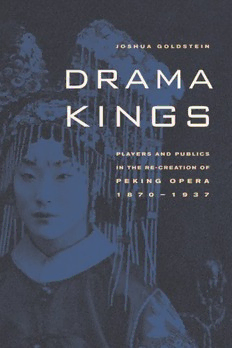
Drama Kings: Players and Publics in the Re-creation of Peking Opera, 1870-1937 PDF
Preview Drama Kings: Players and Publics in the Re-creation of Peking Opera, 1870-1937
Drama Kings The publisher gratefully acknowledges the generous contribution to this book provided by the Asian Studies Endowment Fund of the University of California Press Foundation. Drama Kings Players and Publics in the Re-creation of Peking Opera, 1870–1937 Joshua Goldstein UNIVERSITY OF CALIFORNIA PRESS Berkeley • Los Angeles • London University of California Press, one of the most distinguished university presses in the United States, enriches lives around the world by advancing scholar- ship in the humanities, social sciences, and natural sciences. Its activities are supported by the UC Press Foundation and by philanthropic contributions from individuals and institutions. For more information, visit www.ucpress.edu. University of California Press Berkeley and Los Angeles, California University of California Press, Ltd. London, England © 2007 by The Regents of the University of California Library of Congress Cataloging-in-Publication Data Goldstein, Joshua, 1965– Drama kings : players and publics in the re-creation of Peking opera, 1870–1937 / Joshua Goldstein. p. cm. Includes bibliographical references and index. ISBN978-0-520-24752-9 (cloth : alk. paper) 1. Theater—China—Beijing—History. 2. Operas, Chinese—China—Beijing—History. 3. Mei, Lanfang, 1894–1961. I. Title. PN2876.B37G652007 792.0951'156—dc22 2006036179 Manufactured in the United States of America 15 14 13 12 11 10 09 08 07 06 10 9 8 7 6 5 4 3 2 1 This book is printed on Natures Book, which contains 50% post-consumer waste and meets the minimum requirements of ANSI/NISOZ39.48–1992 (R1997) (Permanence of Paper). Contents List of Illustrations vii Acknowledgments ix Introduction 1 Part One. (Re)Framing the Genre, 1870–1919 1. Late Qing Institutions of Peking Opera 17 2. From Teahouse to Playhouse 55 3. The Experimental Stage, 1895–1920 89 4. May Fourth Realism and Qi Rushan’s Theory of National Drama 134 Part Two. Peking Opera to National Drama, 1920–1937 5. Landscape and Figure, Nation and Character 175 6. The Limits of Reform 209 7. The Gendering of National Culture, Or, The Only Good Woman is a Man 237 8. Nationalization through Iconification 264 Epilogue 291 Notes 297 Bibliography 335 Index 355 Illustrations Additional illustrations, keyed to the chapters of this book, and a glossary of Chinese characters, are posted at http://www-ref.usc.edu/ ~jlgoldst 1. Tan Xinpei 25 2. The Four Famous Dan,from Northern Pictorial 42 3. Lithograph of teahouse brawl, by Wu Youru 59 4. Teahouse floor plan 64 5. Guangxu-era teahouse 65 6. Seating at the Reform Customs Theater 82 7. Mei Lanfang in contemporary dress as title character in Deng Xiagu 120 8. Mei Lanfang in contemporary dress as Li Renfen in A Thread of Hemp 121 9. Mei Lanfang in (new) ancient costume in The Goddess Scatters Flowers 124 10. Mei Lanfang in (new) ancient costume as in A Thousand Pieces of Gold for a Smile 125 11. Shang Xiaoyun as Bojidi inModengjia Girl 166 12. Advertisement for Mei Lanfang cigarettes 203 13. Chart of dan roles from late Qing to the Republic 248 vii 14. Xun Huisheng as Li Feng in Meilong Town 253 15. Cheng Yanqiu as Zhang Huizhu in Tears on a Barren Mountain 261 16. Mei Lanfang riding with Mayor James Rolph in San Franscisco 274 17. Mei Lanfang at reception in Hawaii 274 18. Mei Lanfang receiving honorary doctorate from Pomona College 275 19. Set of stamps commemorating Mei Lanfang, 1962 293 Acknowledgments As with many other aspects of my life, my karmic debts as an academic are beyond my capacity to summarize in these acknowledgments, much less actually repay. I would have to begin, however, with my mentors and classmates at the University of California, San Diego. Joseph Esherick and Paul Pickowicz demonstrated patience bordering on the masochistic when they decided to accept a fidgety welfare advocate into their pro- gram with the hope of making him into a Chinese historian. I’m still hop- ing to become one some day, and continue to rely on their advice and scholarly acumen in pursuing that goal. Dorothy Ko opened intellectual doors for me that I would never have thought to look behind and has provided insights from a conceptual plane that I am occasionally able to glimpse but will never be able to attain. Takashi Fujitani was incredibly generous with his time, energy, and guidance, particularly during some unexpectedly trying moments. Masao Miyoshi, James Holston, George Lipsitz, Lisa Lowe, and Suzanne Cahill were great teachers who helped me form the basic ideas behind my research. As important as these mentors were in training me, my classmates were even more so in sustaining me. Conversations with Madeleine Yue Dong and Michael Chang have been invaluable, and both of them have tried their best to save me from intellectual embarrassment. Sue Fernsebner, Xiao Zhiwei, Andrew Morris, Eric Cazdyn, Elena Songster, Cecily McCaffrey, Liu Lu, Mark Eykholt, Wang Liping, and Julie ix
